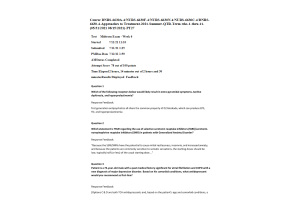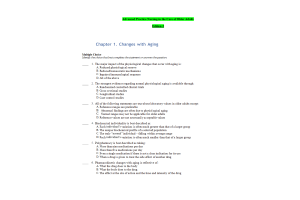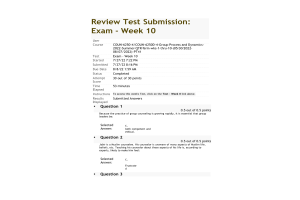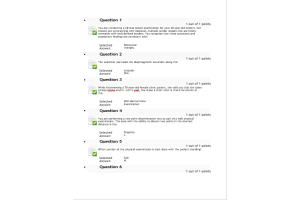COUN 6250-20, Group Process and Dynamics, Week 10 Final Exam
- $49.00
1.Question: A behavior in which a group counselor addresses issues by setting an example of himself or herself is known as:
2.Question: Ideally, informs your practice, and practice refines your approach to group work.
3.Question: Limitations to confidentiality should be outlined:
4.Question: provide a valuable opportunity to reinforce and extend the benefits of the work done during therapy sessions.
5.Question: While group members are sharing extremely personal information, leaders can remind members about as a way of reassuring the member who is disclosing.
6.Question: The technique of is designed to help group members express and clarify concerns they have about their future.
7.Question: The operate to differing degrees in all stages of a group, but they are most often manifested during the working stage.
8.Question: The setting and reinforcement of clearly spelled-out group norms is a recommended way of ensuring group .
9.Question: Jabir is a Muslim counselee. His counselor is unaware of many aspects of Muslim life, beliefs, etc. Teaching his counselor about these aspects of his life is, according to experts, likely to make him feel:
10.Question: Members need to face the reality of and learn how to say good-bye.
11.Question: Isabella continually refers to “Kyle” in what often proves to be lengthy tangents regarding er college years. The name itself evokes a high degree of passion. The group leader can / should:
12.Question: Dan, a 34-year-old homosexual construction worker; April, a 21-year-old hetero sexual single parent; and Sylvester, a 57-year-oldAir Force retiree who underwent a blood-trans fusion two years a go have all been recently diagnosed as HIV-positive. All need to address the issues of coping and “getting on with life.” The appropriate setting for achieving this goal would be:
13.Question: When you find yourself struggling with an ethical dilemma over a values conflict, the best course to follow is to:
14.Question: The logistics of a group includes fees, cancellation policies, and:
15.Question: The major task is to provide the and the challenge necessary for members to face and resolve conflicts and negative reactions that exist within the group and certain behaviors that stem from their defenses against anxiety.
16.Question: Which of the following is of paramount concern when screening and selecting potential group members?
17.Question: As members approach the ending of a group or are leaving an ongoing group, it is equally essential that they be encouraged to ex press their reactions. They may have fears or concerns about .
18.Question: When forming a proposal for a group, which of the five general guideline are as would you ask yourself the question: does your proposal contain strategies for evaluating how well the stated objectives were met?
19.Question: Which of the following is NOT a prompt a leader will use when asking members to complete sentences?
20.Question: All of the following, according to Yalom (2005b), are stated benefits of cohesive groups EXCEPT:
21.Question: occurs when group members or leaders share their observations and personal reactions regarding the behavior of another.
22.Question: A counselor meets with a client who is wearing the traditional garb associated with a particular religious group. The counselor holds a negative view of this group’s beliefs in certain matters. The counselor must, as a first step:
23.Question: Starting a session with a brief can set the group up to involve as many members as possible in productive work forth at session.
24.Question: Which of the following is a characteristic of a working group?
25.Question: For a group to reach the deepest and most effective levels of the Working Stage, it is essential that members to work through areas of interference that hinder achievement.
26.Question: are characterized by changing membership. As certain members leave, new members are admitted, and the group continues.
27.Question: The process of encourages members to accept responsibility for the outcomes of a group and for changing the style in which they relate to others.
28.Question: A healing capacity develops within the group as members increasingly experience _____ of who they are.
29.Question: Groups provide a natural laboratory and a sense of that demonstrates to people that they are not alone and that there is hope for creating a different life.
30.Question: A factor to be aware of when terminating a group is the leaders own history with .
31.Question: Many short-term psycho educational groups are structured around:
32.Question: underlies much of members behavior in the transitional phase.
33.Question: A characteristic of many members in beginning groups is the tendency to:
34.Question: Which of the following is a clear sign that trust is being built within the group?
35.Question: Group work of ten provides the potential to further a agenda:
36.Question: Some members may lack understanding or experience in participating in groups, and their struggle to learn new behavior patterns should not be labeled as .
37.Question: Leaders should avoid until they have earned that right by building a trusting relationship with the members.
38.Question: Which of the following is NOT considered a critical-to-address characteristic of the Transition Stage?
39.Question: The self-assessment of group leadership skills will help a beginning leader identify:
40.Question: The reactions members develop toward the group leader and other members can bring out intense feelings in those who are the target of their reactions.
41.Question: Conflict is most likely to occur during which stage of a therapeutic group?
42.Question: Leaders have a responsibility to discuss any breaches with the group and to take action if a member:
43.Question: The importance of the is a well-established critical component of effective therapy.
44.Question: Each member must actively work to open him-or herself to others and to addressing the issues that get in the way of doing so.
45.Question: Because the practice of group counseling is growing rapidly, it is essential that group leaders be:
46.Question: in the emerging field of inter personal neurobiology confirms that healing changes can occur in the brain when clients experience a warm, non judgmental, empathic relationship with a carring counselor.
47.Question: A competent the rapist remains in the counseling process while maintaining openness about .
48.Question: encompasses the values, beliefs, and behaviors shared by a group of people.
49.Question: If (s) is/are brought to the forefront and dealt with constructively, a negative can be turned into something therapeutic.
50.Question: is a form of feedback that is a basic part of a productive group, and also of any healthy relationship.
51.Question: Personal , by the leader, can be useful when it is intentional and keeps the focus of attention on the group members rather than on the leader.
52.Question: Even the thought of is sometimes overwhelming and can stop a person before he or she has begun.
53.Question: The done prior to beginning a group helps us learn the history of group members, which enables us to better understand some of their reactions during the group process.
54.Question: generally refers to groups that are time limited, have a preset time for termination, have a process orientation, and are professionally led.
55.Question: Groups displaying non working group behaviors may be working but:
56.Question: There is no steadfast rule as to when a leader should or should not .
57.Question: Before groups progress to a level of deeper work, which we refer to as the working stage, they typically experience a:
58.Question: Mort works in a position of authority. He is a college guidance counselor. He is now a member of a court-mandated group. When others speak of their problems, he is always the first to react, even at the risk of cutting other would-be responders. He seems to speak more than any other member. His behaviors could legitimately be construed as:
59.Question: Characteristics of a cohesive group include all of the following EXCEPT:
60.Question: Members may become more aware of their apprehensions as they experience the group process. As the group moves through the stages:

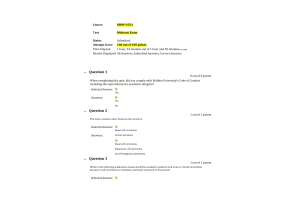
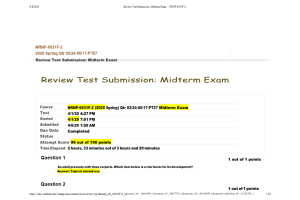
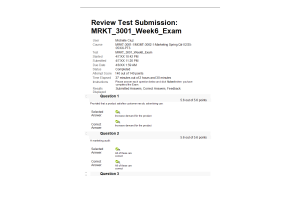
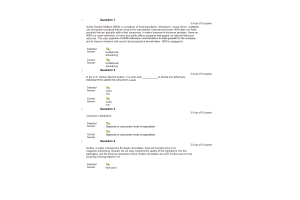
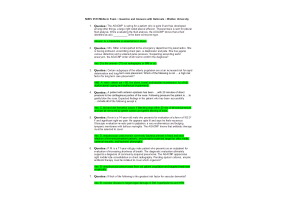
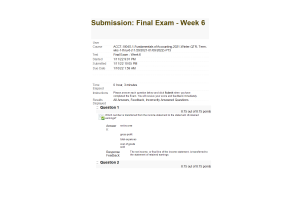
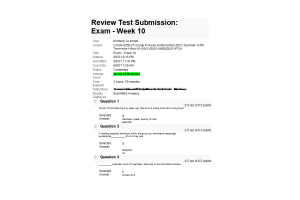
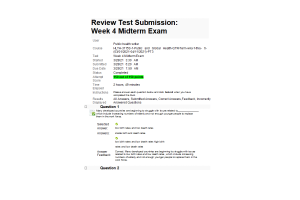
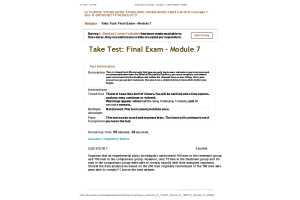
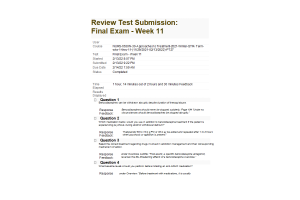
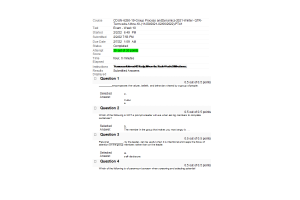

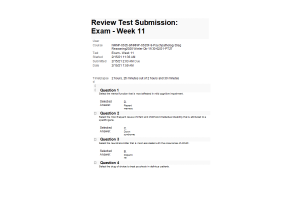
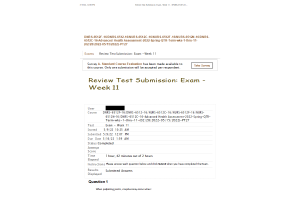
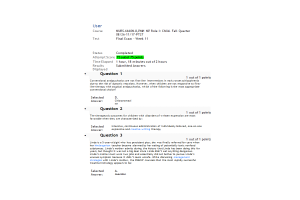
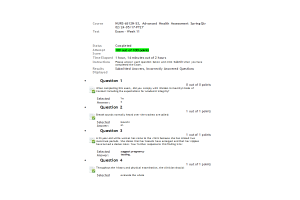
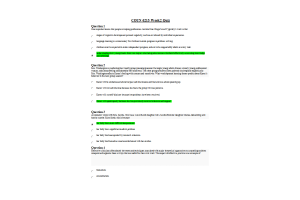
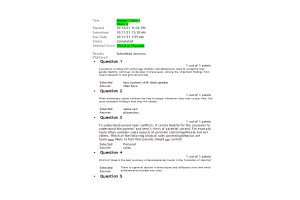
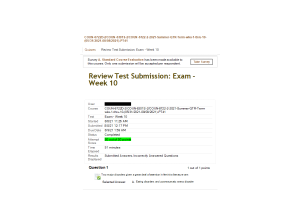
-300x200.png)
